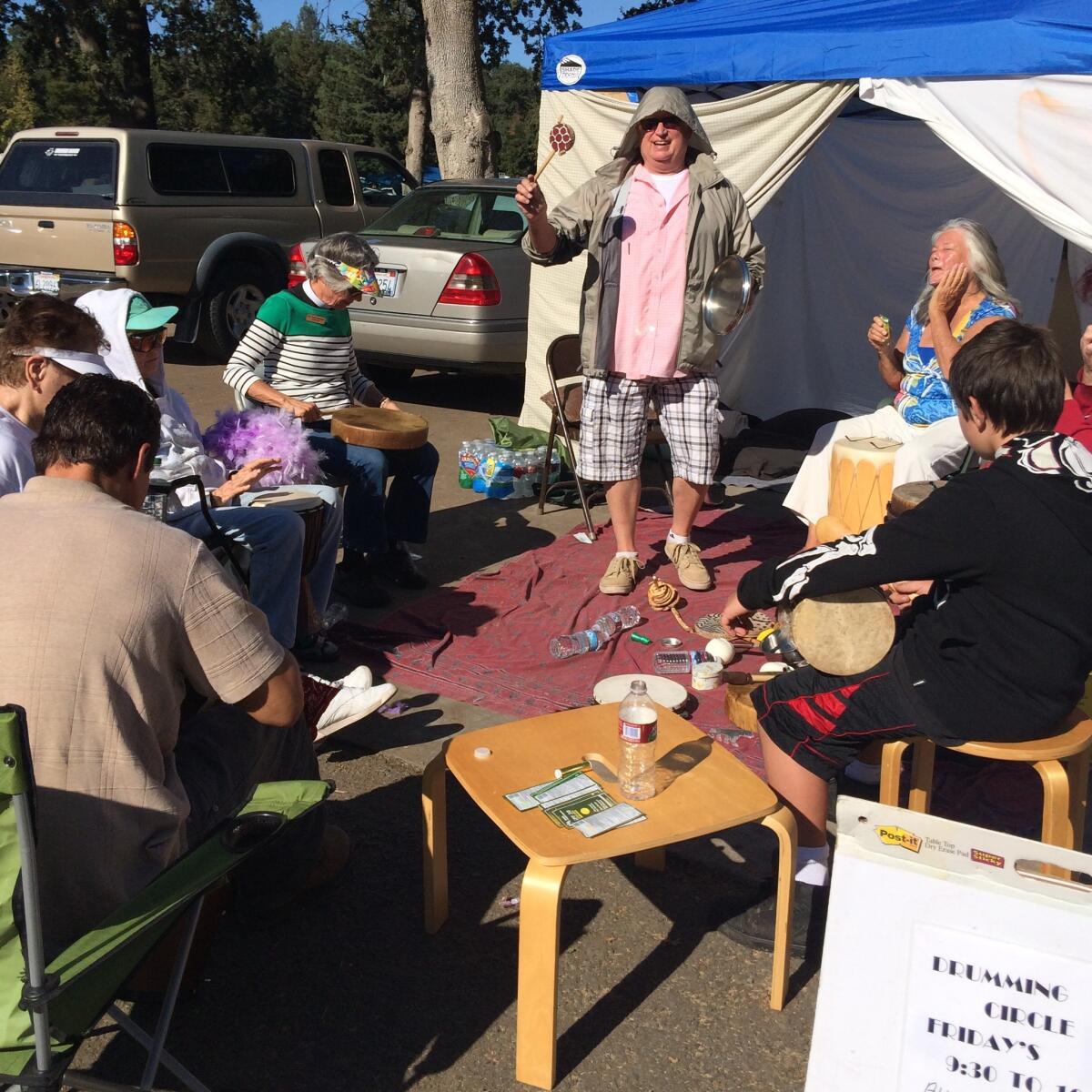Disaster camp Napa style: Hell’s angels and dog groomers

Evacuees from the Valley fire participate in a drum circle at a Red Cross disaster center set up at the Calistoga Fairgrounds.
- Share via
Reporting from Calistoga, Calif. — The Red Cross knows how to run a disaster shelter.
Napa Valley knows how to do it with panache. The evacuation center that evolved over a week at the Calistoga Fairgrounds for those sheltering from the Valley fire was like nothing that seasoned disaster workers had ever seen.
Students from the Culinary Institute of America came in to cook meals as did the Athletic Boosters from Calistoga High School.
The selection included blueberry croustade, hot sauce from scratch and cobb salads alongside more traditional buffet fare.
A group of bikers rolled in on Thursday with their motorcycles to throw a barbecue.
There were tents offering meditation, massage, yoga, and just “good vibes.” There were flu shots, group therapy tents and even dog groomers from a local pet salon.
Alcoholics Anonymous set up daily meetings. Multiple drum circles started, one group at one point encircling and embracing a young boy whose stricken face softened as he joined in, timidly patting a bongo.
A mental health team set up a counseling tent as well as a volleyball net, and a college group offered inspirational singing and non-denominational prayers.
More than 1,100 of the estimated 7,000 people who were forced out of their homes by the seven-day fire wound up at the fairgrounds.
The American Red Cross provided cots, medical services and about three dozen volunteers on average each day, said regional marketing manager Katie Wilkes, who was in Calistoga from Chicago.
A second shelter for Valley fire evacuees had been created in Kelseyville, and other shelters were open for those displaced by the Butte fire to the east.
But from the start, tents began popping up in every flat space available at the fairground as families arrived with what belongings they had, and dogs in crates or roaming, on leash and not. Residents in Napa Valley and the San Francisco Bay streamed in with services, tents and sleeping bags.
Tiki Dellamore, a grandmother from Santa Cruz who declined to give her age, estimated this was the 60th disaster she had volunteered for, starting with the 1989 Loma Prieta earthquake. Compared with the rest, she said, the Valley fire shelter was unique.
Local volunteer efforts eclipsed those of many of the designated nonprofits that contract for such work, and disputes arose between independent efforts. But Dellamore ascribed the unusual scene at Calistoga to the “compromises” that had been reached to permit unorthodox assistance, including allowing a large community of pets at a no-pet shelter.
Dellamore is following in the footsteps of her mother and her grandmother. She threw herself into the work after the death of her husband, a farmer who grew Brussels sprouts.
She does it, she said, because of the distraught faces of evacuees that shift to hope as they leave. “You see the progression that we’ve been able to help them make,” she said, “from devastation to some light.”
Twitter: @paigestjohn
More to Read
Sign up for Essential California
The most important California stories and recommendations in your inbox every morning.
You may occasionally receive promotional content from the Los Angeles Times.











